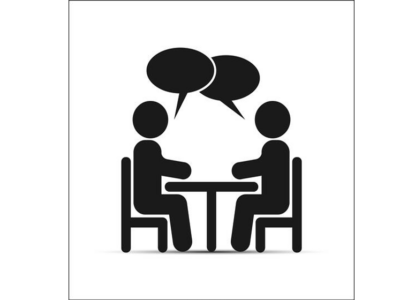How to create a trusting relationship and manage both results, development and cooperation? How to develop yourself as a leader through conversations? Performance conversations, development conversations, cooperation conversations, one-on-one (1:1) conversations – all different conversations are an opportunity to create a trusting bond and increase the employee’s commitment, or, on the contrary, to break the bond and demotivate.
A prerequisite for a trusting relationship is interest in the person. Interest in their natural talents, dreams and desires. If you, as a leader, take the time to understand people and give them honest feedback, trust is created. A trusting relationship is built conversation by conversation.
Kim Scott describes radical honesty as one of the fundamental ways to build a trusting relationship. Radical candor consists mainly of two components: personal care and direct feedback. Kim Scott says, “Personal care is the antidote to robotic professionalism as bossy arrogance. Personal care is taking the time to have a real conversation; getting to know each other on a human level; understanding what’s important to them; sharing what makes us get out of bed in the morning and go to work—and which also works the other way around.”
How to learn more about people? The easiest way is, of course, to ask during various conversations. If you feel that a person needs help to analyze themself or you want to use a uniform methodology in the team, then you could do personality tests for the team members. I use Gallup strengths tests in my work and I see very positive results in teams that have taken the time to get to know themselves and each other better. Analyzing and sharing the results on the team day builds trust in the team, and it is equally important that the manager continues to refer to the strengths in further conversations. Again, a trusting relationship is built conversation by conversation.
Different companies have different practices when it comes to conversations. However the name is given to the conversation, in practice there are various combinations where both the result conversation and the development conversation, the result, development and cooperation conversations, etc. are put together. All conversations have a role to play in leadership, and it seems to me that the best results are achieved through a combination of all conversations. For the sake of clarity, I will describe the different types of conversation separately, which can be combined according to the purpose.
The performance discussion, development discussion and cooperation discussion are rather long-term oriented – they are held over a longer period of time, usually once a year or, in the best case, a few times a year. Their time duration is mostly 1.5-2 hours. One-on-one conversations are more practical in nature and take place regularly once a week or over two weeks. In terms of time, usually 30 minutes to 1 hour. The results discussion, development discussion and cooperation discussion are rather more formal – in most cases, the results are also stored on a prescribed form somewhere and forwarded to the personnel department. Regular 1:1 conversations are of a more informal nature and their content and agreements remain known to the manager and the employee. It is definitely advisable to take notes of these conversations as well, but for those involved, rather than to be forwarded to anyone.
Conversation type | Frequency | Format | Time duration |
Result, development, cooperation discussion | 2 times a year | formal | 1,5-2h |
1:1 conversation | once a week or once every 2 weeks | informal | 30min -1h |
Perormance conversations
As a rule, performance conversations are held at the beginning of the year. The purpose of this conversation is to summarize the results of the previous period and set goals for the new period. Some examples of questions used to summarize the previous period: How was your year as a whole? Rate it on a scale of 1-10. Which goals were met, which were not met? What were you particularly satisfied with? What could have been better? Where did you feel that you needed my help as a leader more? And some examples of setting goals for the following period: What do you plan to do this year? How do we measure whether the goal was met? By what time will the goal be met? What do you need my support as a manager?
Developemnt conversations
Development conversations can be combined with performance interviews, but in this case significantly more time should be planned for the interview. The purpose of the development interview is to understand what motivates the employee, what are their natural talents, needs, expectations and development wishes. Some examples of questions that could be asked in a development interview: What activities do you enjoy most at work? What activities do you put off? What is one thing you haven’t done yet but would like to do? What are your long-term plans? Where do you want to develop yourself? What support / help do you need for this?
Cooperation discussions
The cooperation discussion can include parts of the performance and development discussion. The word cooperation refers to bilateralism. If the previous types of conversation are more employee-oriented, the goal of the collaboration conversation is also to discuss the employee’s expectations of the manager: what does the manager do well today? what could be better? in which matters would a person need more support from the manager, where less? What could be done to make cooperation go better?
The purpose of a regular 1:1 conversation is to maintain both an emotional and a rational connection and to regularly review what was agreed upon in the previous types of conversation. This is the employee’s uninterrupted time with you as the manager. Keep it sacred and don’t postpone 1:1 matches because something more important came up. Your people are the most important item on your schedule. The content of regular 1:1s is mostly created by the employee themselves. Your role is to find out what is important for the employee at the moment and what they need your support for. It is also good to review from time to time during regular meetings how progress is being made towards bigger goals.
In all conversations, it is important that the manager has a positive attitude, an open mind and a sincere interest and desire to help. Every manager should develop the ability to listen and practice different techniques to open up the employee and help them reach solutions. As a manager, we often want to start giving advice right away, but from the point of view of employee development, it is important to remain a supporter rather than a solver as a manager.
In summary, whatever conversations you have, do it out of a sincere desire to support the other person and help them bring results. Different conversations are your tools for growing mutual and team trust, thereby increasing the company’s performance.



